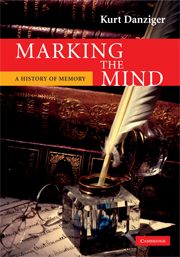2 - The rule of metaphor
Published online by Cambridge University Press: 05 June 2012
Summary
The persistence of metaphor
Throughout its history, memory discourse has provided a rich field for the play of metaphors. This continued to be the case even after memory became a topic for scientific psychology. In fact, this area of psychology is unusual in the frankness with which the role of metaphor has been widely recognized. Little more than a decade ago a discussion of metaphors in memory research in the journal Behavioral and Brain Sciences drew in some twenty-five contributors, the great majority of them experimental psychologists. Yet well over two thousand years ago metaphor already played a major role in the first sustained discussion of memory in Europe, that of Plato. Nor is it difficult to find numerous examples of memory metaphors during the intervening centuries. What accounts for this amazing persistence? Any answer to that question requires a closer look at the nature of memory metaphors.
First of all, it is necessary to remind ourselves that, when one speaks of ‘metaphors’ in this context, one is not referring to isolated figures of speech used as a literary device. It is rather a question of interconnected ‘metaphoric networks’, whose members are linked by ties of analogy and resemblance. There is often a convergence of meaning on a so-called ‘root metaphor’ that is felt to define something essential about the field to which it is applied. Such formations encourage the production of new metaphorical variants and extensions that exploit the implications of the core metaphor.
- Type
- Chapter
- Information
- Marking the MindA History of Memory, pp. 24 - 58Publisher: Cambridge University PressPrint publication year: 2008



